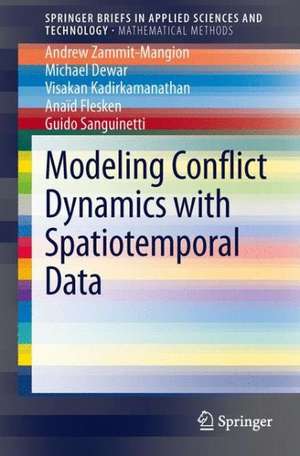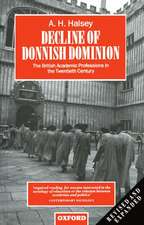Modeling Conflict Dynamics with Spatio-temporal Data: SpringerBriefs in Applied Sciences and Technology
Autor Andrew Zammit-Mangion, Michael Dewar, Visakan Kadirkamanathan, Anaïd Flesken, Guido Sanguinettien Limba Engleză Paperback – 11 oct 2013
The book also demonstrates the methods on the WikiLeaks Afghan War Diary, the results showing that this approach allows deeper insights into conflict dynamics and allows a strikingly statistically accurate forward prediction of armed opposition group activity in 2010, based solely on data from preceding years. The target audience primarily comprises researchers and practitioners in the involved fields but the book may also be beneficial for graduate students.
Din seria SpringerBriefs in Applied Sciences and Technology
-
 Preț: 380.29 lei
Preț: 380.29 lei - 17%
 Preț: 360.34 lei
Preț: 360.34 lei - 20%
 Preț: 386.12 lei
Preț: 386.12 lei -
 Preț: 380.07 lei
Preț: 380.07 lei -
 Preț: 377.95 lei
Preț: 377.95 lei -
 Preț: 382.32 lei
Preț: 382.32 lei -
 Preț: 376.59 lei
Preț: 376.59 lei -
 Preț: 379.09 lei
Preț: 379.09 lei -
 Preț: 378.12 lei
Preț: 378.12 lei - 20%
 Preț: 293.83 lei
Preț: 293.83 lei -
 Preț: 344.90 lei
Preț: 344.90 lei -
 Preț: 321.36 lei
Preț: 321.36 lei -
 Preț: 264.79 lei
Preț: 264.79 lei -
 Preț: 344.90 lei
Preț: 344.90 lei -
 Preț: 356.46 lei
Preț: 356.46 lei -
 Preț: 382.95 lei
Preț: 382.95 lei -
 Preț: 355.66 lei
Preț: 355.66 lei -
 Preț: 479.67 lei
Preț: 479.67 lei -
 Preț: 415.18 lei
Preț: 415.18 lei -
 Preț: 444.52 lei
Preț: 444.52 lei - 20%
 Preț: 301.86 lei
Preț: 301.86 lei -
 Preț: 409.43 lei
Preț: 409.43 lei - 20%
 Preț: 322.17 lei
Preț: 322.17 lei -
 Preț: 355.49 lei
Preț: 355.49 lei - 15%
 Preț: 462.51 lei
Preț: 462.51 lei -
 Preț: 377.18 lei
Preț: 377.18 lei -
 Preț: 355.93 lei
Preț: 355.93 lei -
 Preț: 382.95 lei
Preț: 382.95 lei -
 Preț: 378.12 lei
Preț: 378.12 lei -
 Preț: 378.12 lei
Preț: 378.12 lei -
 Preț: 380.07 lei
Preț: 380.07 lei -
 Preț: 380.07 lei
Preț: 380.07 lei - 20%
 Preț: 326.28 lei
Preț: 326.28 lei -
 Preț: 312.68 lei
Preț: 312.68 lei -
 Preț: 356.43 lei
Preț: 356.43 lei -
 Preț: 412.30 lei
Preț: 412.30 lei - 20%
 Preț: 225.31 lei
Preț: 225.31 lei -
 Preț: 378.12 lei
Preț: 378.12 lei -
 Preț: 376.59 lei
Preț: 376.59 lei -
 Preț: 195.87 lei
Preț: 195.87 lei -
 Preț: 376.22 lei
Preț: 376.22 lei - 20%
 Preț: 324.64 lei
Preț: 324.64 lei - 20%
 Preț: 288.73 lei
Preț: 288.73 lei -
 Preț: 377.57 lei
Preț: 377.57 lei -
 Preț: 261.91 lei
Preț: 261.91 lei -
 Preț: 381.98 lei
Preț: 381.98 lei -
 Preț: 273.64 lei
Preț: 273.64 lei -
 Preț: 410.87 lei
Preț: 410.87 lei -
 Preț: 379.68 lei
Preț: 379.68 lei -
 Preț: 374.30 lei
Preț: 374.30 lei
Preț: 376.22 lei
Nou
Puncte Express: 564
Preț estimativ în valută:
71.99€ • 76.98$ • 60.02£
71.99€ • 76.98$ • 60.02£
Carte tipărită la comandă
Livrare economică 18 aprilie-02 mai
Preluare comenzi: 021 569.72.76
Specificații
ISBN-13: 9783319010373
ISBN-10: 3319010379
Pagini: 84
Ilustrații: VIII, 74 p. 13 illus., 1 illus. in color.
Dimensiuni: 155 x 235 x 4 mm
Greutate: 0.14 kg
Ediția:2013
Editura: Springer International Publishing
Colecția Springer
Seriile SpringerBriefs in Applied Sciences and Technology, SpringerBriefs in Mathematical Methods
Locul publicării:Cham, Switzerland
ISBN-10: 3319010379
Pagini: 84
Ilustrații: VIII, 74 p. 13 illus., 1 illus. in color.
Dimensiuni: 155 x 235 x 4 mm
Greutate: 0.14 kg
Ediția:2013
Editura: Springer International Publishing
Colecția Springer
Seriile SpringerBriefs in Applied Sciences and Technology, SpringerBriefs in Mathematical Methods
Locul publicării:Cham, Switzerland
Public țintă
ResearchCuprins
Conflict Data Sets and Point Patterns.- Theory.- Modelling and Prediction in Conflict: Afghanistan.
Textul de pe ultima copertă
This authored monograph presents the use of dynamic spatiotemporal modeling tools for the identification of complex underlying processes in conflict, such as diffusion, relocation, heterogeneous escalation, and volatility. The authors use ideas from statistics, signal processing, and ecology, and provide a predictive framework which is able to assimilate data and give confidence estimates on the predictions.
The book also demonstrates the methods on the WikiLeaks Afghan War Diary, the results showing that this approach allows deeper insights into conflict dynamics and allows a strikingly statistically accurate forward prediction of armed opposition group activity in 2010, based solely on data from preceding years. The target audience primarily comprises researchers and practitioners in the involved fields but the book may also be beneficial for graduate students.
The book also demonstrates the methods on the WikiLeaks Afghan War Diary, the results showing that this approach allows deeper insights into conflict dynamics and allows a strikingly statistically accurate forward prediction of armed opposition group activity in 2010, based solely on data from preceding years. The target audience primarily comprises researchers and practitioners in the involved fields but the book may also be beneficial for graduate students.
Caracteristici
Presents a self-contained introduction to conflict modeling Provides novel concepts which are broadly applicable Contains supplementary material, e.g. code and data sets Written by experts in the field Includes supplementary material: sn.pub/extras














